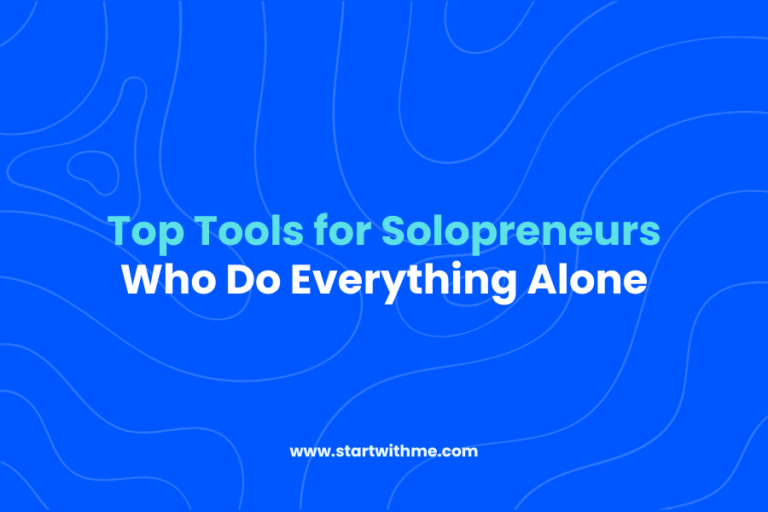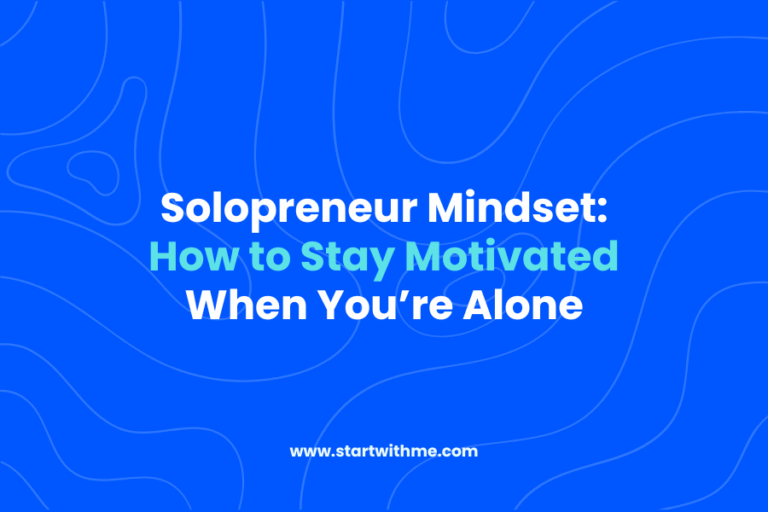When you work solo, distractions don’t knock—they walk right in.
There’s no team lead breathing down your neck. No coworker glancing over. No office schedule to keep you in line.
You have the freedom to work whenever and wherever you want…
And that’s both a blessing and a focus-killing curse.
As a solopreneur, staying focused isn’t just about getting more done — it’s about protecting your energy, honoring your time, and building your dream without burning out.
Let’s dive into why focus is so hard when you’re solo — and what you can do about it.
Why Focus Is Harder When You’re Solo
When you’re your own boss, there’s no external pressure to perform — and that sounds amazing until it isn’t.
Here’s why solo work can secretly sabotage your focus:
- No accountability. No one notices if you scroll TikTok for 30 minutes or take a nap mid-day.
- Fake productivity traps. It’s easy to trick yourself with low-effort tasks: rearranging your Notion dashboard, tweaking fonts, or reorganizing folders.
- Mental fatigue. Without a clear separation between “boss mode” and “worker mode,” your brain tires quickly from constant decision-making.
- Infinite distractions. Social media, emails, phone notifications — all waiting to derail your deepest work.
Focus is a muscle. And if you’re building a business on your own, you’ll need to train it — intentionally.
7 Practical Tips to Stay Focused on Your Own
1. Design a Distraction-Free Workspace
You don’t need a fancy office. You just need a clear space.
Remove visual clutter. Close unrelated browser tabs. Put your phone in another room.
Try this: Set up a “work-only zone” — even if it’s a small corner. When you enter it, you’re on.
2. Use Time Blocks, Not Endless To-Do Lists
Instead of writing a giant list of tasks, assign time to them.
Use Google Calendar, Notion, or even pen & paper.
Example:
- 9:00–11:00 AM: Write blog content
- 1:00–2:00 PM: Edit newsletter
- 3:00–4:00 PM: Admin or learning
It forces you to respect your time like a real job.
3. Try the Pomodoro Technique
Work for 25 minutes, rest for 5. That’s one Pomodoro. After 4, take a longer break.
This method helps you dive deep — without burning out your brain.
Bonus: You can track Pomodoros to see how much deep work you actually do each day.
4. Kill Notifications Ruthlessly
Every ping is a productivity thief.
- Turn off app notifications
- Mute Slack or social tabs
- Use “Do Not Disturb” mode on your phone
You’re not a robot, but you can build distraction-proof zones.
5. Set Clear Daily Intentions
Each day, identify just 1–3 needle-moving tasks. Not 20. Not all your backlog.
Ask: “If I only got this done today, would I feel progress?”
Clarity reduces overwhelm. And reduces the chance you’ll drift off into busywork.
6. Create Routines That Reduce Decisions
Decision fatigue is real.
The fewer choices you make, the more focus you save.
Examples:
- Morning writing routine
- Set work hours
- Pre-scheduled lunch breaks
- Same coffee, same playlist
7. Hold Yourself Accountable (Publicly or Privately)
You don’t need a boss. But you do need a system.
- Use a habit tracker
- Journal progress
- Share weekly goals with your audience or accountability buddy
Public or private — the goal is to notice your own actions.
Tools That Help You Stay on Track
Tech won’t save you — but it can support you.
In the next section, we’ll cover the top tools that help solopreneurs build focus-friendly systems without adding complexity.
Bạn có muốn mình tiếp tục ngay phần “Recommended Tools That Help You Stay on Track” không?
Dưới đây là phần nội dung tiếp theo cho bài viết “How to Stay Focused When You Work Alone”, tiếp tục từ H2: Tools That Help You Stay on Track đến phần Conclusion + FAQs:
Tools That Help You Stay on Track
You don’t need 10 apps. You need 1–3 that actually help you show up consistently.
Here are some solo-tested tools worth trying:
Notion — Organize your tasks and thoughts
Build a custom dashboard to plan your day, track goals, and brain-dump ideas.
Bonus: Create a simple daily focus tracker with checkboxes for wins, blockers, and next steps.
Use it for: Daily planning, habit tracking, project maps.
Motion or Sunsama — Schedule your day like a pro
These smart calendar tools combine task lists with time blocks.
They nudge you to focus on what matters now, not just what’s on your backlog.
Use it for: Realistic time management, blocking deep work sessions.
Forest or Focusmate — Beat procrastination with external help
- Forest gamifies your focus: Stay off your phone to grow virtual trees.
- Focusmate pairs you with real humans for 25/50-min co-working sessions.
Use it for: Instant accountability, especially if you get lonely or distracted.
Cold Turkey or Freedom — Block what drains your brain
These apps block access to social media, YouTube, or other tempting sites for specific hours.
Use it for: Locking in distraction-free work blocks — especially writing, coding, or creative tasks.
Toggl Track — See where your time actually goes
Manually or automatically track how you spend time across different projects.
You’ll be surprised how much time “quick tasks” really steal.
Use it for: Self-awareness, client billing (if freelancing), and optimizing focus blocks.
Conclusion: You Don’t Need More Time — Just Better Focus
Working solo isn’t about doing more. It’s about doing the right things, consistently.
You already have the skills.
Now, give yourself the space, the rhythm, and the systems to focus — without burning out.
Remember:
- Start small (1–2 focus blocks per day)
- Use tools, not as crutches, but as amplifiers
- Protect your mental energy like your business depends on it — because it does.
You’re not lazy. You’re just overloaded. Strip away the noise, and you’ll find your natural drive again.
FAQs: Staying Focused as a Solopreneur
Q1: What if I get bored easily while working alone?
Change your environment. Alternate between workspaces (home, café, library). Use background music or ambient noise. Focus doesn’t have to be silent — it just has to be intentional.
Q2: Should I try working at night if I can’t focus in the morning?
Absolutely. Find your biological prime time. If your brain lights up at 10PM, structure your schedule around that. Flexibility is the solopreneur’s secret weapon.
Q3: How do I stop multitasking?
Use full-screen mode. Turn off notifications. And remind yourself: multitasking is just switching between tasks quickly — and losing focus every time.
Q4: How can I hold myself accountable without a team?
Join a solo business community. Share weekly goals publicly. Or even write yourself a weekly review. The goal is to create self-awareness, not guilt.
Ready to stop drifting and start doing?
Start with just 1 change today.
Focus isn’t built overnight — but it’s always built by showing up.
—
📬 Get more honest, practical solo tips like this at startwithme.online — and download your free Solo Starter Kit.



